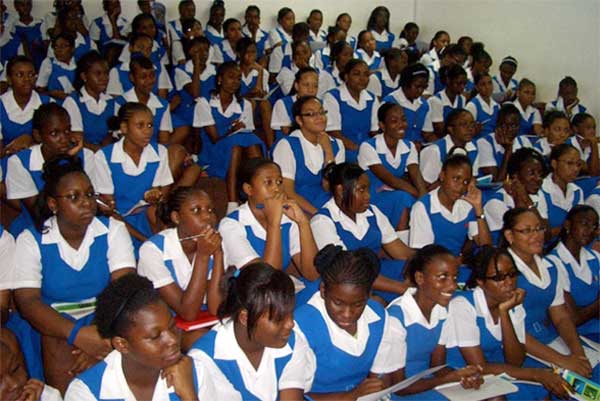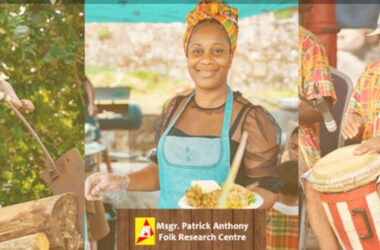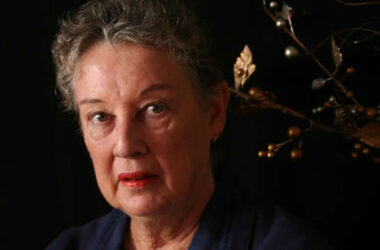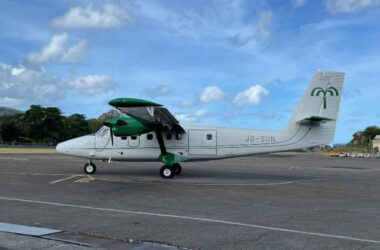ST. JOSEPH’S Convent has topped this year’s Caribbean Secondary Education Certificate (CSEC)) examinations for the fifth straight year, followed by Bonne Terre Preparatory School, St. Mary’s College and Leon Hess Comprehensive Secondary.

Squeals of joy and heavy hearts of despair were the scenes last week among students who wrote the May/June exams, when results were announced.
St. Joseph’s Convent, for the past five years has had an overall CSEC performance rate of 98 percent and upwards. Never, within that period has the school fallen below that mark. This year its overall performance rate is 98.71 percent.
Bonne Terre Preparatory registered an overall performance grade of 94.75 percent, St. Mary’s College 94.21 percent and Leon Hess Secondary 93.55 percent.
Compare that with the Gros Islet Secondary School, AnseGer Secondary School, Bocage Secondary School, Vide Bouteille Secondary School and others and the contrast speaks for itself. Those schools this year registered an overall CSEC performance of 43.75 percent, 28.39 percent, 35.33 percent and 49.29 percent respectively.
The overall pass rate at the General and Technical Proficiency Levels was 71.41 percent, a percentage point decrease compared to 2015.
This year 11 secondary schools recorded decreases in their performances, while pass rates for individual subjects ranged from 45.84 percent to 100 percent with mathematics at the lowest and Mechanical Engineering and Home Economics Management at the highest end of that range, although no Grade One passes were attained in Home Economics Management.
This year registered some good news in that 17 of the 34 subjects recorded an increase in performance from the previous year.
As is usually the case, Mathematics (2380) and English A (2234) had the most entrants. However the results were not encouraging as only 261 out of all who wrote Mathematics received a Grad One, 316 Grade Two, 514 Grade Three, 366 Grade Four, 798 Grade Five and 125 Grade Six.
With respect to English A, 509 of those who wrote the subject received a Grade One, 524 received a Grade Two, 560 Grade Three, 412 Grade Four, 202 Grade Five and 27 Grade Six.
Regarding the CAPE exams this year the Caribbean Examinations Council (CXC) gave a regional overview of students’ performance stating that it remained consistent with that of the past five years.
According to the Council approximately 90 per cent of the entries achieved Grades One to Four, which are the acceptable grades at CAPE. Thirteen percent of the entries achieved Grade One, just under 20 per cent achieved Grade Two, 23 per cent achieved Grade Three, 20 percent Grade Four and 14 per cent achieved Grade Five.
Performance improved in 19 of the Units offered this year. These include a ten percent improvement in History Unit 1 with 81 per cent of entries achieving acceptable grades compared with 71 per cent in 2015. There was also a 10 percent improvement in performance in Management of Business Unit 1 with 96 percent of entries achieving Grades One to Five compared with 86 per cent in 2015.
Environmental Science Unit 1 saw an eight percent improvement with 97 percent achieving acceptable grades this year compared with 89 percent last year.
For Computer Science Unit 2, there was a four percent improvement in performance. Ninety-six percent of entries achieved Grades One to Five this year compared with 92 per cent in 2015. Similarly, 90 percent of entries for Applied Mathematics achieved acceptable grades compared with 86 per cent in 2015, for a four per cent improvement.
In five Units, entries achieved 100 per cent of acceptable grades; these include Art and Design Unit 1, Performing Arts Unit 2 (Cinematic Arts), Performing Arts Unit 2 (Drama), Performing Arts Unit 2 (Music), and Digital Media Unit 2. Other New Generation CAPE subjects that returned exceptional results include Entrepreneurship Unit 2 and Physical Education and Sport Unit 2 in which 99 percent of entries for both Units achieved acceptable grades.
Ninety-nine per cent of entries for Management of Business Unit 2 and French Unit 2 also achieved acceptable grades.
Two subjects were offered at CAPE for the first time at the May/June 2016 sitting: Logistics and Supply Chain Operations and Integrated Mathematics. Seventy-one percent of entries for Logistics and Supply Chain Operations Unit 1 achieved acceptable grades, while 50 per cent of entries for Unit 2 achieved similar grades. For Integrated Mathematics, the recently introduced compulsory Unit to obtain the CXC Associate Degree for students not doing any other CAPE Mathematics Unit, 47 per cent of entries achieved acceptable grades.
The subject previously offered as Geometrical and Mechanical Engineering was changed to Building and Mechanical Engineering Drawing (BMED), and offered for the first time at this year’s May/June sitting. Eighty-six percent of entries for BMED (Mechanical Engineering) Unit 1, and 75 per cent for BMED Unit 1 (Building Drawing) achieved acceptable grades. Ninety per cent of entries for BMED Unit 2 (Mechanical Engineering) and 84 per cent of entries for BMED Unit 2 (Building Drawing) achieaed acceptable grades.
Performance in Caribbean Studies and Communication Studies, the two traditional compulsory Units at CAPE continues to be excellent. For both Units, 97 per cent of entries achieved acceptable grades.
The number of CAPE candidates this year grew by just over 300, from 30, 547 candidates in 2015 to 30, 859 candidates this year. The number of subject entries however fell marginally from 122, 795 entries in 2015 to 121, 711 in 2016. The two largest CAPE Units remain Communication Studies and Caribbean Studies with 16, 425 entries and 12, 565 entries respectively. Pure Mathematics with 5704 entries, Management of Business with 5195 entries, and Chemistry Unit 1 with 5126 entries complete the top five CAPE Units.















Anse ger should be shut down then. Waste of taxpayers money.